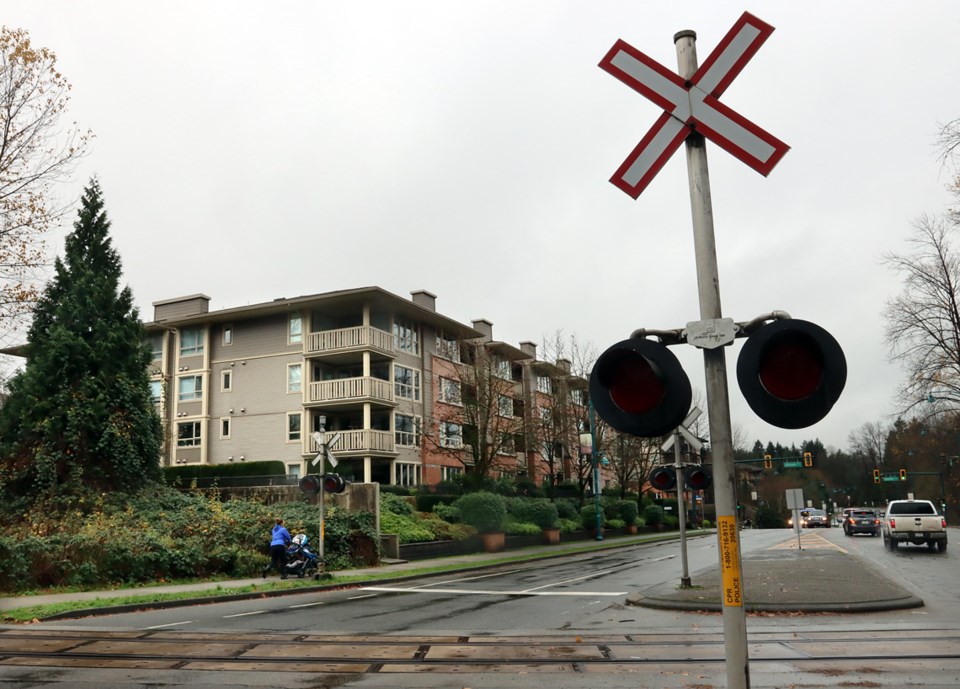Trains travelling to and from the Imperial Oil refinery in Ioco are keeping residents of the Klahanie and Suter Brook neighbourhoods awake at night when they cross Murray Street, disrupting conversations and waking sleeping babies.
Pat Godwin, who lives in the Nahanni condo tower in Klahanie, says the trains have become more frequent and louder in recent months. Last Tuesday she presented a petition with about 100 signatures collected from residents in her building complaining of the noise and calling for the installation of a level crossing at Murray Street.
Godwin said the whistle engineers blow to alert motorists on Murray Street of their train’s approach to the unprotected crossing is especially bad when the weather is warming and people have their windows and balcony doors open.
In her presentation to council, Godwin documented almost 20 trains crossing Murray Street between 9:30 p.m. and midnight over the past several months. The majority of those crossings, she said, were announced by loud blasts of the train’s whistle, although for a few an attendant got off the train and walked across the intersection to alert traffic and advise the engineer it was clear to cross.
That’s an application of Rule 103 of the Canadian Railway Operating Rules (CROR) that governs the movement of trains. It states a train not headed by an engine or headed by a remotely controlled engine as it approaches an unprotected crossing must be protected by a crew member on the leading car or on the ground who is able to warn people standing on, or about to cross, the track and ensure the way is clear for the train to proceed.
The use of train whistles is also regulated.
According to Rule 14 of the CROR, they’re required when a train passes a whistle post located 1/4 mile before a level crossing if the train is going more than 44 mph, or to provide 20 seconds of warning prior to reaching the crossing when the train is going slower than that.
And while the rule states the whistle signal has to be “prolonged or repeated until the crossing is fully occupied,” the engineer doesn’t have to use it if the train is already manually protected at the crossing by an attendant.
Godwin said that doesn’t happen enough, and the late night whistles are making life miserable, She added the best solution would be a gated crossing.
“This would allow train passage without the intense whistle blowing,” she said. “The noise is totally unfortunate.”
Another neighbour of the crossing told council the noise can be “so incredible, you can’t even hear what is going on in your apartment.”
Several letters Godwin submitted with her petition documented the growing frustration of residents in nearby condos.
One said the train whistles wake their baby at night and scare her during the day. Another said the disruption had been tolerable until the trains became longer and more frequent
“They parade through at all hours.”
Coun. Diana Dilworth said the issue of train noise is as old as the rail line itself, but with more people living adjacent to the tracks it may be time to reinvigorate the city’s CP Rail advisory panel.
Coun. Steve Milani, who’s the chair of that panel, told the Tri-City News it hasn’t convened in several years although Mayor Rob Vagramov had recently hosted a community meeting, that included a representative from CP Rail, to discuss train noise.
“It’s a never-ending issue,” he said.
Vagramov suggested a gated crossing might be the best solution, given the city’s growth.
“We’re past the Mickey Mouse stage of our development,” he said. “We really need to get this crossing in order.”
But such a crossing might not be easy nor cheap to achieve.
Transport Canada has rigorous procedures communities requesting cessation of train whistles must follow, including consultation with the railway, an assessment by the municipality and the railway whether a crossing meets regulatory requirements to end the whistles and notification to its rail safety branch.
In New Westminster, residents along that city’s waterfront lobbied for almost two decades to get trains to stop blowing their whistles when crossing Quayside Drive as well as at the foot of Begbie and Fourth streets and gated crossings at the latter two cost a total of more than $1.2 million.
— with a file from Theresa McManus, New Westminster Record

